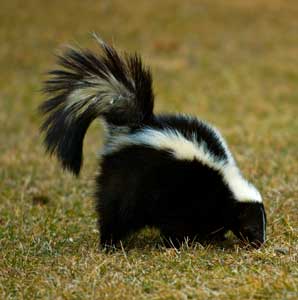|
My wife and I can’t say that we aren’t sick of it. Three nights, so far this summer, a black and whitey has been somewhere around the outside of our house and sprayed its stink so bad, it was unbearable. It would happen between 1:00 a.m. and 2:00 a.m. in the morning. I’d have to get up and shut down all of our air conditioners. And, even that didn’t seem to help. The smell was so penetrating that I could not go back to sleep on the third attack. The only good thing that happened was it peeved me off so, because the smell wouldn’t go away and I couldn’t go back to sleep, that the skunk gave me food for thought.
It is true that whether you live in the suburbs or even in the city or are a town dweller, as the weather warms you may, on occasions, notice the sickening scent of skunk in the breeze. New Hampshire’s skunk populations are now more active and they are out and about from dusk to dawn. Their breeding season peaks in March. Each night, females may roam up to half a square mile and males can range over five square miles while looking for a mate.

During May or early June, female skunks give birth to 6 or 7 babies, and adults get busy foraging for food, day and night, for their young ones. Skunks are said to eat insects and earthworms. In summer, insects make up nearly half their diet. But, they also eat snails, small rodents (such as voles and moles), bird eggs, fruit, garbage and carrion. So, although their stink isn’t welcome, these creatures do play an important part in pest control.
Members of the weasel family, striped skunks are always black and white with varying patterns and amounts of white fur. They are famous for defending themselves with their God-given scent glands and they can spray their opponent or threat up to 10 feet away. Biologists say to “watch for their warning dance before they fire: foot stomping, hissing and turning their back with tail raised.” But, the question that arises with me and my wife is, what caused the skunk that was on our property to spray? Was it some other animal, maybe a coyote or fox? Was it one of our two night out cats? Or was it something else? One of our cats is a roamer. The other stays nearby outside and close to the porch. When our black and white cat came in, he didn’t smell like he had been sprayed. I guess we’ll never know what set that dang skunk off to spoil our night’s sleep.
New Hampshire Fish and Game fisheries biologist, Rich Tichko, had a harrowing experience with a skunk that is worth mentioning. His family’s dog was put into its daytime kennel one morning. When the family returned home that night, they discovered a skunk on top of the doghouse. Unfortunately, not before the dog had gotten out and run through the house, licking and greeting Tichko’s whole family. Since the skunk had no doubt been in the kennel with the dog all day, Tichko realized there was a good chance the animals had made direct contact with each other. They may have exchanged body fluids - saliva, mucous, or tears. This meant that Tichko had to consider the possibility of rabies.
Rich killed the skunk and, wearing protective gloves, he bagged it and took it in for testing. The healthy-looking skunk turned out to be carrying rabies virus. Because Tichko’s family had come into contact with the dog’s saliva after its skunk encounter, each family member had to get shots and rabies vaccine, and the dog was quarantined.
This incident is an important reminder that if your family pet comes into direct contact with a skunk, or if you see any type of unusual behavior, such as a wild animal pacing back and forth or showing signs of aggression, you should contact Fish and Game Dispatch at (603) 271-3361 or call your local police department. Keep in mind that rabies transmission isn’t likely if your dog or cat just gets sprayed or chases a skunk. But, we should all be aware of the possible dangers and never, ever pick up a little skunk baby.
Yes, skunks are a pretty looking animal, and I have seen my share over the years. However, whatever it is that is making them spay on our property at night, is really aggravating. We wish they’d just go away.
|



